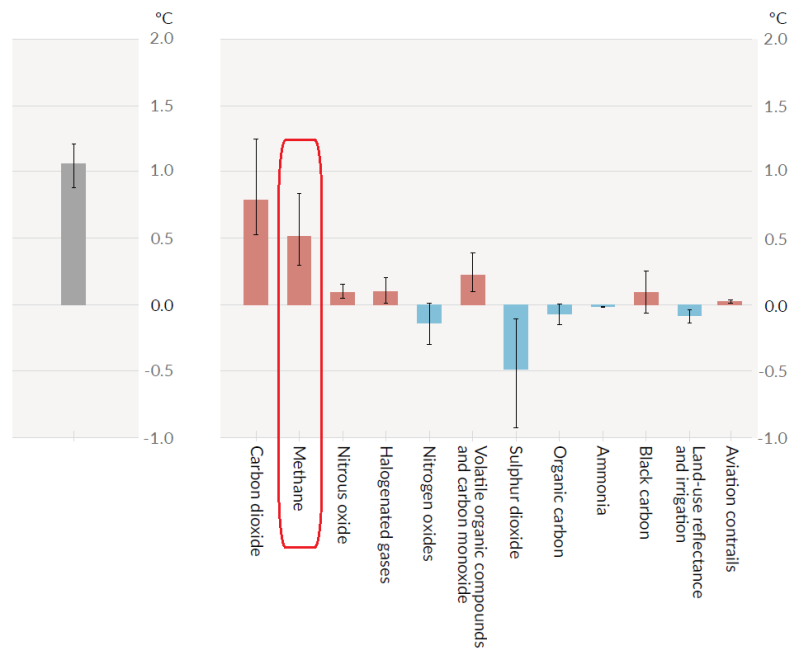Methane - The second culprit in global warming
Methane is one of the three major greenhouse gases and the second most significant driver of global warming following carbon dioxide. In comparison to carbon dioxide, methane is more potent but has a much lower atmospheric concentration and stays in the atmosphere for a shorter duration. According to the Sixth Assessment Report (AR6) of United Nations Intergovernmental Panel on Climate Change (IPCC), global average surface temperature in 2010-2019 was about 1.1°C above pre-industrial levels, of which about 0.5°C was contributed by methane (Figure 1).
The largest natural sources of methane include anoxic water and sediments of wetlands and freshwater lakes, gas and oil seeps, and mud volcanoes. The largest anthropogenic emissions sources are enteric fermentation from cattle and sheep in livestock production, manure treatment, landfills, waste treatment, rice cultivation and fossil fuel exploitation.
Methane emissions have nearly doubled in the past two centuries and they are mainly driven by human since 1900. The present-day atmospheric concentration of methane was unprecedented in at least 800,000 years (Figure 2). Against the background of continued global warming, permafrost in the cryosphere is projected to continue to warm and thaw, releasing methane and carbon dioxide to the atmosphere and enhancing the greenhouse effect to form a vicious cycle.
At the United Nations Climate Change Conference in 2021, over 100 countries pledged to reduce global methane emissions by 30% by 2030. To achieve the goals of Paris agreement, there is an urgent need to step up efforts to reduce emissions.

Figure 1 Global average surface warming in 2010-2019 relative to 1850-1900 (left), contributions of various factors (right) (Source: IPCC AR6[1]).

Figure 2 Atmospheric concentration of methane (Source: IPCC AR6[2]).
References :
1. Figure SPM.2 from IPCC, 2021: Summary for Policymakers. In: Climate Change 2021: The Physical Science Basis. Contribution of Working Group I to the Sixth Assessment Report of the Intergovernmental Panel on Climate Change [Masson- Delmotte, V., P. Zhai, A. Pirani, S. L. Connors, C. Péan, S. Berger, N. Caud, Y. Chen, L. Goldfarb, M. I. Gomis, M. Huang, K. Leitzell, E. Lonnoy, J. B. R. Matthews, T. K. Maycock, T. Waterfield, O. Yelekçi, R. Yu and B. Zhou (eds.)]. Cambridge University Press. In Press.
2. Figure 5.4 from Josep G. Canadell, J. G., P. M.S. Monteiro, M. H. Costa, L. Cotrim da Cunha, P. M. Cox, A. V. Eliseev, S. Henson, M. Ishii, S. Jaccard, C. Koven, A. Lohila, P. K. Patra, S. Piao, J. Rogelj, S. Syampungani, S. Zaehle, K. Zickfeld, 2021, Global Carbon and other Biogeochemical Cycles and Feedbacks. In: Climate Change 2021: The Physical Science Basis. Contribution of Working Group I to the Sixth Assessment Report of the Intergovernmental Panel on Climate Change [Masson-Delmotte, V., P. Zhai, A. Pirani, S. L. Connors, C. Péan, S. Berger, N. Caud, Y. Chen, L. Goldfarb, M. I. Gomis, M. Huang, K. Leitzell, E. Lonnoy, J. B. R. Matthews, T. K. Maycock, T. Waterfield, O. Yelekçi, R. Yu and B. Zhou (eds.)]. Cambridge University Press. In Press.